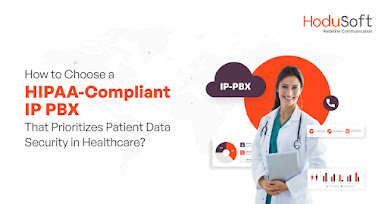How to Choose a HIPAA-Compliant IP PBX That Prioritizes Patient Data Security in Healthcare?
If you are in the healthcare sector then you must be knowing how important it is to protect confidential and sensitive data of patients. Failing to do so not only violates patient trust but also goes against strict guidelines by the Health Insurance Portability and Accountability Act (HIPAA).
And that can mean heavy penalties. As per stats, the United States Department of Health and Human Services (HHS) issued USD four million in fines. In total, 109 million patients were affected by the breaches.
That’s why healthcare providers need to do whatever it takes to ensure data security and compliance with HIPAA. Leveraging sophisticated digital communication systems such as IP PBX software can help.
This article delves into the importance of choosing an IP PBX system that prioritizes patient data security and explores key considerations for healthcare organizations in making this decision.
Why Data Security Is A Must in the Healthcare Sector?
From medical histories to billing details, healthcare organizations handle a huge amount of confidential data on a daily basis. That’s why they need to focus on patient data security.
It is not just a matter of compliance but about safeguarding sensitive information. Failure to do so will result in serious consequences for both patients and healthcare providers.
Things Healthcare Providers Must Consider While Choosing an IP PBX System
IP PBX systems have revolutionized communication within healthcare settings by offering a wide range of features. These advancements streamline communication, enhance collaboration among healthcare professionals, and improve patient care. Here are some factors healthcare providers must consider while selecting IP PBX software
1. HIPAA Compliance: The foremost consideration for any healthcare organization is ensuring that the IP PBX system is HIPAA-compliant. This means that the IP PBX system meets all the requirements that HIPAA lays out for protecting privacy and security of patient data. Healthcare providers must ensure that their systems abide by the strict standards outlined in HIPAA for the patient information.
2. Encryption: Look for an IP PBX system that employs robust encryption protocols to secure data transmission over networks. Encryption ensures that even if intercepted, patient data remains unintelligible to unauthorized parties.
3. Access Controls: Implement stringent access controls to restrict unauthorized access to patient data within the IP PBX system. This includes role-based access permissions and multi-factor authentication to ensure that only authorized personnel can view or manipulate sensitive information.
4. Secure Call Recording: Many healthcare organizations rely on call recording for quality assurance and training purposes. However, it's essential to choose an IP PBX system that offers secure call recording features, including encryption of recorded calls and strict access controls to prevent unauthorized playback or sharing.
5. Regular Updates and Patches: It is extremely crucial for healthcare providers to opt for an IP PBX software provider that prioritizes security and regularly releases updates and patches to address vulnerabilities and strengthen system defenses against emerging threats.
6. Vendor Reputation and Support: Research the reputation of IP PBX vendors in the healthcare industry and choose a vendor with a track record of providing reliable support and proactive security measures tailored to the unique needs of healthcare organizations.
7. Integration with Secure Communication Channels: Ensure that the chosen IP PBX system seamlessly integrates with other secure communication channels utilized within the healthcare organization, such as secure messaging platforms or encrypted email services.
This integration facilitates the secure exchange of sensitive patient information across various communication channels while maintaining compliance with HIPAA regulations and bolstering overall data security measures. Additionally, it promotes workflow efficiency and collaboration among healthcare professionals while safeguarding patient privacy.
Conclusion:
In an era where healthcare data breaches are increasingly common, selecting the right IP PBX system is not just a matter of convenience but a critical component of safeguarding patient privacy and maintaining regulatory compliance.
By prioritizing HIPAA compliance, encryption, access controls, secure call recording, regular updates, and vendor reputation, healthcare organizations can choose an IP PBX system that not only enhances communication efficiency but also fortifies the security of patient data, mitigating the risk of potential HIPAA hangovers. Remember, in healthcare, there's no room for compromise when it comes to protecting patient information.




Comments
Post a Comment